Paper - TextBoxes: A Fast Text Detector with a Single Deep Neural Network-AAAI2017
Paper - TextBoxes++: A Single-Shot Oriented Scene Text Detector-2018
TextBoxes 和 TextBoxes++ 是基于 SSD 的基础上进行的改进. 这里主要简单测试 TextBoxes 和 TextBoxes++ 的文字检测部分.
1. 网络结构
1.1. TextBoxes
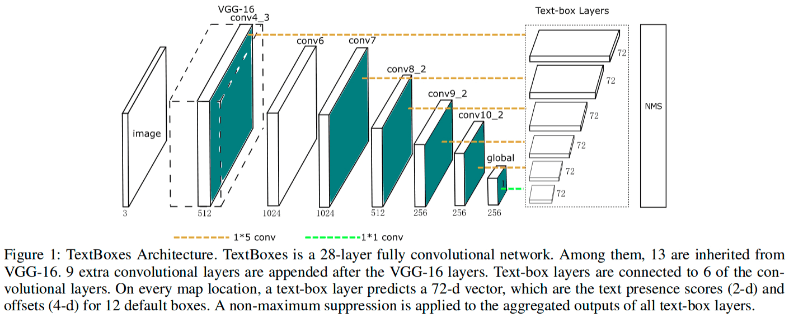
1.2. TextBoxes++
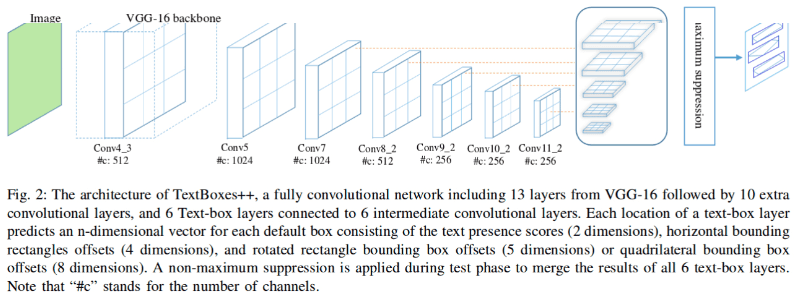
2. 测试Demo
模型下载:
TextBoxes:
TextBoxes++:
- deploy.prototxt
- model trained on ICDAR 2015 Incidental Text - 百度网盘
- model trained on ICDAR 2015 Incidental Text - Dropbox
2.1. TextBoxes
#!/usr/bin/python3
import numpy as np
import matplotlib.pyplot as plt
import sys
from nms import nms
import cv2
caffe_root = '/path/to/TextBoxes/'
sys.path.insert(0, caffe_root+'python')
import caffe
caffe.set_device(0)
caffe.set_mode_gpu()
class general_textboxes_detector(object):
def __init__(self, use_multi_scale=False):
self.net_height = 768
self.net_width = 768
prototxt = './icdar13/deploy.prototxt'
caffemodel = './icdar13/TextBoxes_icdar13.caffemodel'
self.net = caffe.Net(prototxt, caffemodel, caffe.TEST)
self.det_score_threshold = 0.2
self.overlap_threshold = 0.2
if use_multi_scale:
# self.scales = ((300, 300), (700, 700),
# (700, 500), (700, 300),
# (1600, 1600))
self.scales = ((300, 300), (700, 700),
(700, 500), (700, 300))
else:
self.scales = ((700, 700),)
def get_transformer(self, net_height, net_width):
transformer = caffe.io.Transformer(
{'data': (1, 3, net_height, net_width)})
transformer.set_transpose('data', (2, 0, 1))
transformer.set_mean('data', np.array([104, 117, 123]))
transformer.set_raw_scale('data', 255)
transformer.set_channel_swap('data', (2, 1, 0))
return transformer
def extract_detections(self, detections, img_height, img_width):
dt_results = []
# Parse the outputs.
det_label = detections[0, 0, :, 1]
det_conf = detections[0, 0, :, 2]
det_xmin = detections[0, 0, :, 3]
det_ymin = detections[0, 0, :, 4]
det_xmax = detections[0, 0, :, 5]
det_ymax = detections[0, 0, :, 6]
top_indices = [i for i, conf in enumerate(det_conf)
if conf >= self.det_score_threshold]
top_conf = det_conf[top_indices]
top_xmin = det_xmin[top_indices]
top_ymin = det_ymin[top_indices]
top_xmax = det_xmax[top_indices]
top_ymax = det_ymax[top_indices]
for i in range(top_conf.shape[0]):
xmin = int(round(top_xmin[i] * img_width))
ymin = int(round(top_ymin[i] * img_height))
xmax = int(round(top_xmax[i] * img_width))
ymax = int(round(top_ymax[i] * img_height))
xmin = max(1, xmin)
ymin = max(1, ymin)
xmax = min(img_width - 1, xmax)
ymax = min(img_height - 1, ymax)
score = top_conf[i]
dt_result = [xmin, ymin, xmax, ymin, xmax, ymax, xmin, ymax, score]
dt_results.append(dt_result)
return dt_results
def apply_quad_nms(self, bboxes):
dt_results = sorted(bboxes, key=lambda x: -float(x[8]))
nms_flag = nms(dt_results, self.overlap_threshold)
results = []
for k, dt in enumerate(dt_results):
if nms_flag[k]:
if dt not in results:
results.append(dt)
return results
def predict(self, img_file):
img = caffe.io.load_image(img_file)
img_height, img_width, channels = img.shape
scales_results = []
for scale in self.scales:
img_resize_height, img_resize_width = scale[0], scale[1]
print("[INFO]Img resize height: {}, Img resize width: {}"
.format(img_resize_height, img_resize_width))
self.net.blobs['data'].reshape(1,
3,
img_resize_height,
img_resize_width)
transformer = self.get_transformer(
img_resize_height, img_resize_width)
transformed_image = transformer.preprocess('data', img)
self.net.blobs['data'].data[...] = transformed_image
# Forward pass.
detections = self.net.forward()['detection_out']
scale_results = self.extract_detections(
detections, img_height, img_width)
scales_results.extend(scale_results)
# apply non-maximum suppression
results = self.apply_quad_nms(scales_results)
return results
def vis_res(self, img_file, results):
img_cv2 = cv2.imread(img_file)
plt.figure(figsize=(10, 8))
plt.imshow(img_cv2[:, :, ::-1])
currentAxis = plt.gca()
for result in results:
score = result[-1]
x1 = result[0]
y1 = result[1]
x2 = result[2]
y2 = result[3]
x3 = result[4]
y3 = result[5]
x4 = result[6]
y4 = result[7]
quad = np.array([[x1, y1],
[x2, y2],
[x3, y3],
[x4, y4]])
color_quad = 'r'
currentAxis.add_patch(
plt.Polygon(quad,
fill=False,
edgecolor=color_quad,
linewidth=2))
plt.axis('off')
plt.show()
def analyze():
general_textboxes_detector_model = \
general_textboxes_detector(use_multi_scale=True)
img_file = 'test.jpg'
results = general_textboxes_detector_model.predict(img_file)
general_textboxes_detector_model.vis_res(img_file, results)
print('[INFO]Detection Done.')
if __name__ == '__main__':
analyze()如:
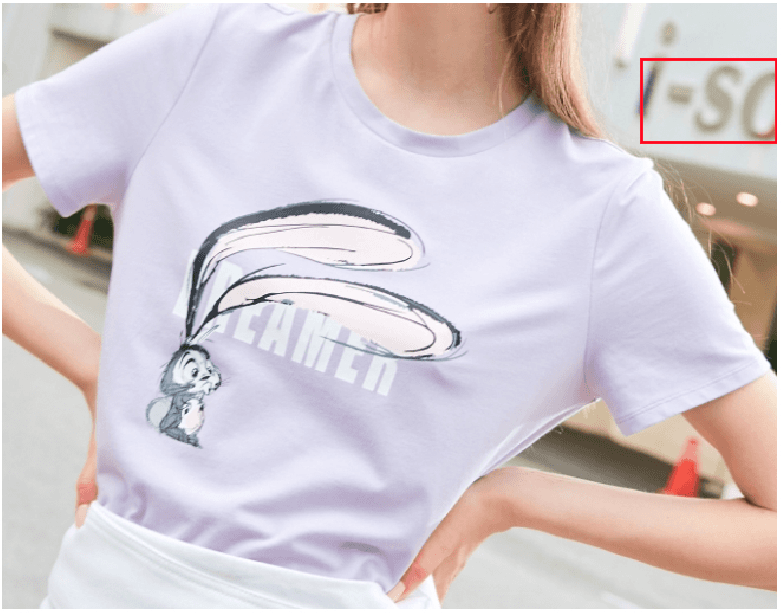
2.2. TextBoxes++
#!/usr/bin/python3
import cv2
import numpy as np
import matplotlib.pyplot as plt
from nms import nms
import sys
caffe_root = '/path/to/TextBoxes_plusplus/'
sys.path.insert(0, caffe_root + 'python')
import caffe
caffe.set_device(0)
caffe.set_mode_gpu()
class general_textboxes_detector(object):
def __init__(self):
self.net_height = 768
self.net_width = 768
prototxt = './icdar15/deploy.prototxt'
caffemodel = './icdar15/model_icdar15.caffemodel'
self.net = caffe.Net(prototxt, caffemodel, caffe.TEST)
self.net.blobs['data'].reshape(1,
3,
self.net_height,
self.net_width)
self.transformer = caffe.io.Transformer(
{'data': (1, 3, self.net_height, self.net_width)})
self.transformer.set_transpose('data', (2, 0, 1))
self.transformer.set_mean('data', np.array([104, 117, 123]))
self.transformer.set_raw_scale('data', 255)
self.transformer.set_channel_swap('data', (2, 1, 0))
self.det_score_threshold = 0.2
self.overlap_threshold = 0.2
def extract_detections(self, detections, img_height, img_width):
det_conf = detections[0, 0, :, 2]
det_x1 = detections[0, 0, :, 7]
det_y1 = detections[0, 0, :, 8]
det_x2 = detections[0, 0, :, 9]
det_y2 = detections[0, 0, :, 10]
det_x3 = detections[0, 0, :, 11]
det_y3 = detections[0, 0, :, 12]
det_x4 = detections[0, 0, :, 13]
det_y4 = detections[0, 0, :, 14]
# Get detections with confidence higher than 0.6.
top_indices = [i for i, conf in enumerate(det_conf)
if conf >= self.det_score_threshold]
top_conf = det_conf[top_indices]
top_x1 = det_x1[top_indices]
top_y1 = det_y1[top_indices]
top_x2 = det_x2[top_indices]
top_y2 = det_y2[top_indices]
top_x3 = det_x3[top_indices]
top_y3 = det_y3[top_indices]
top_x4 = det_x4[top_indices]
top_y4 = det_y4[top_indices]
bboxes = []
for i in range(top_conf.shape[0]):
x1 = int(round(top_x1[i] * img_width))
y1 = int(round(top_y1[i] * img_height))
x2 = int(round(top_x2[i] * img_width))
y2 = int(round(top_y2[i] * img_height))
x3 = int(round(top_x3[i] * img_width))
y3 = int(round(top_y3[i] * img_height))
x4 = int(round(top_x4[i] * img_width))
y4 = int(round(top_y4[i] * img_height))
x1 = max(1, min(x1, img_width - 1))
x2 = max(1, min(x2, img_width - 1))
x3 = max(1, min(x3, img_width - 1))
x4 = max(1, min(x4, img_width - 1))
y1 = max(1, min(y1, img_height - 1))
y2 = max(1, min(y2, img_height - 1))
y3 = max(1, min(y3, img_height - 1))
y4 = max(1, min(y4, img_height - 1))
score = top_conf[i]
bbox = [x1, y1, x2, y2, x3, y3, x4, y4, score]
bboxes.append(bbox)
return bboxes
def apply_quad_nms(self, bboxes):
dt_lines = sorted(bboxes, key=lambda x: -float(x[8]))
nms_flag = nms(dt_lines, self.overlap_threshold)
results = []
for k, dt in enumerate(dt_lines):
if nms_flag[k]:
if dt not in results:
results.append(dt)
return results
def predict(self, img_file):
img = caffe.io.load_image(img_file)
transformed_img = self.transformer.preprocess('data', img)
self.net.blobs['data'].data[...] = transformed_img
img_height, img_width, channels = img.shape
detections = self.net.forward()['detection_out']
bboxes = self.extract_detections(detections, img_height, img_width)
# apply non-maximum suppression
results = self.apply_quad_nms(bboxes)
return results
def vis_res(self, img_file, results):
img_cv2 = cv2.imread(img_file)
plt.figure(figsize=(10, 8))
plt.imshow(img_cv2[:, :, ::-1])
currentAxis = plt.gca()
for result in results:
score = result[-1]
x1 = result[0]
y1 = result[1]
x2 = result[2]
y2 = result[3]
x3 = result[4]
y3 = result[5]
x4 = result[6]
y4 = result[7]
quad = np.array([[x1, y1],
[x2, y2],
[x3, y3],
[x4, y4]])
color_quad = 'r'
currentAxis.add_patch(
plt.Polygon(quad,
fill=False,
edgecolor=color_quad,
linewidth=2))
plt.axis('off')
plt.show()
def analyze():
general_textboxes_detector_model = general_textboxes_detector()
img_file = "test.jpg"
results = general_textboxes_detector_model.predict(img_file)
general_textboxes_detector_model.vis_res(img_file, results)
print('[INFO]Detection Done.')
if __name__ == '__main__':
analyze()如:
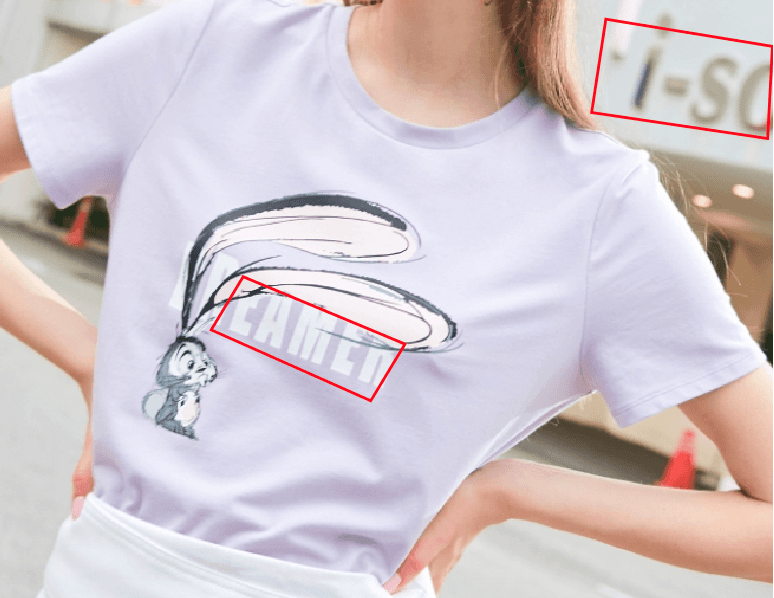
相比于 TextBoxes,这张图片来看效果更好.
2.3. Textboxes NMS 函数
import shapely
from shapely.geometry import Polygon,MultiPoint
def polygon_from_list(line):
"""
Create a shapely polygon object from gt or dt line.
"""
#polygon_points = [float(o) for o in line.split(',')[:8]]
polygon_points = np.array(line).reshape(4, 2)
polygon = Polygon(polygon_points).convex_hull
return polygon
def polygon_iou(list1, list2):
"""
两个 shapely 多边形间的 IoU.
"""
polygon_points1 = np.array(list1).reshape(4, 2)
poly1 = Polygon(polygon_points1).convex_hull
polygon_points2 = np.array(list2).reshape(4, 2)
poly2 = Polygon(polygon_points2).convex_hull
union_poly = np.concatenate((polygon_points1,polygon_points2))
if not poly1.intersects(poly2):
# this test is fast and can accelerate calculation
iou = 0
else:
try:
inter_area = poly1.intersection(poly2).area
#union_area = poly1.area + poly2.area - inter_area
union_area = MultiPoint(union_poly).convex_hull.area
if union_area == 0:
return 0
iou = float(inter_area) / union_area
except shapely.geos.TopologicalError:
print('shapely.geos.TopologicalError occured, iou set to 0')
iou = 0
return iou
def nms(boxes,overlap):
rec_scores = [b[-1] for b in boxes]
indices = sorted(range(len(rec_scores)),
key=lambda k: -rec_scores[k])
box_num = len(boxes)
nms_flag = [True]*box_num
for i in range(box_num):
ii = indices[i]
if not nms_flag[ii]:
continue
for j in range(box_num):
jj = indices[j]
if j == i:
continue
if not nms_flag[jj]:
continue
box1 = boxes[ii]
box2 = boxes[jj]
box1_score = rec_scores[ii]
box2_score = rec_scores[jj]
# str1 = box1[9]
# str2 = box2[9]
box_i = [box1[0],box1[1],box1[4],box1[5]]
box_j = [box2[0],box2[1],box2[4],box2[5]]
poly1 = polygon_from_list(box1[0:8])
poly2 = polygon_from_list(box2[0:8])
iou = polygon_iou(box1[0:8],box2[0:8])
thresh = overlap
if iou > thresh:
if box1_score > box2_score:
nms_flag[jj] = False
if box1_score == box2_score and \
poly1.area > poly2.area:
nms_flag[jj] = False
if box1_score == box2_score and \
poly1.area<=poly2.area:
nms_flag[ii] = False
break
'''
if abs((box_i[3]-box_i[1])-(box_j[3]-box_j[1])) <
((box_i[3]-box_i[1])+(box_j[3]-box_j[1]))/2:
if abs(box_i[3]-box_j[3])+abs(box_i[1]-box_j[1])<
(max(box_i[3],box_j[3])-min(box_i[1],box_j[1]))/3:
if box_i[0]<=box_j[0] and \
(box_i[2]+min(box_i[3]-box_i[1],box_j[3]-box_j[1])>=box_j[2]):
nms_flag[jj] = False
'''
return nms_flag3. 网络 deploy 结构可视化
利用 Netron 导入 deploy.prototxt 的网络结构.
3.1. TextBoxes
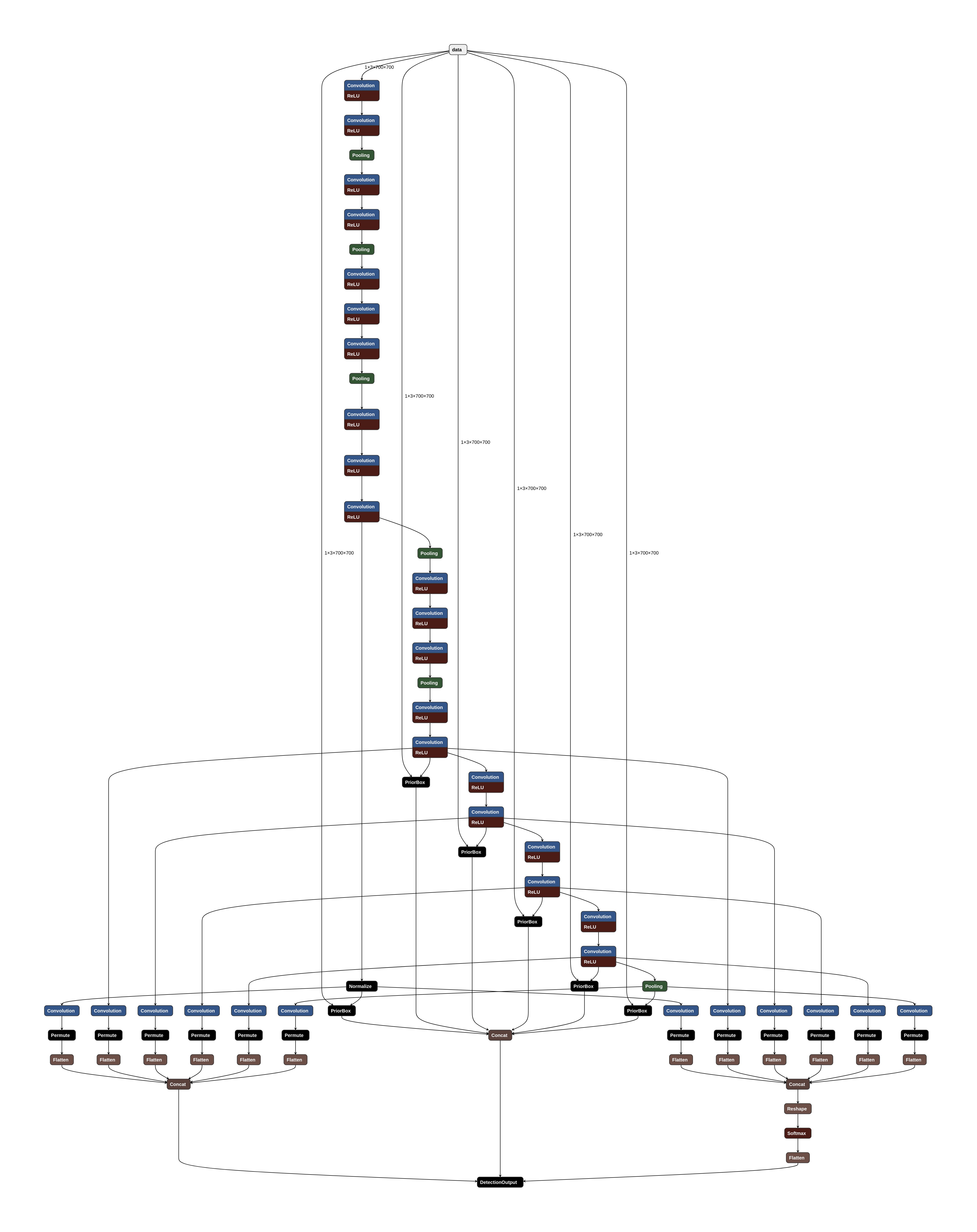
点击放大.
3.1. TextBoxes++
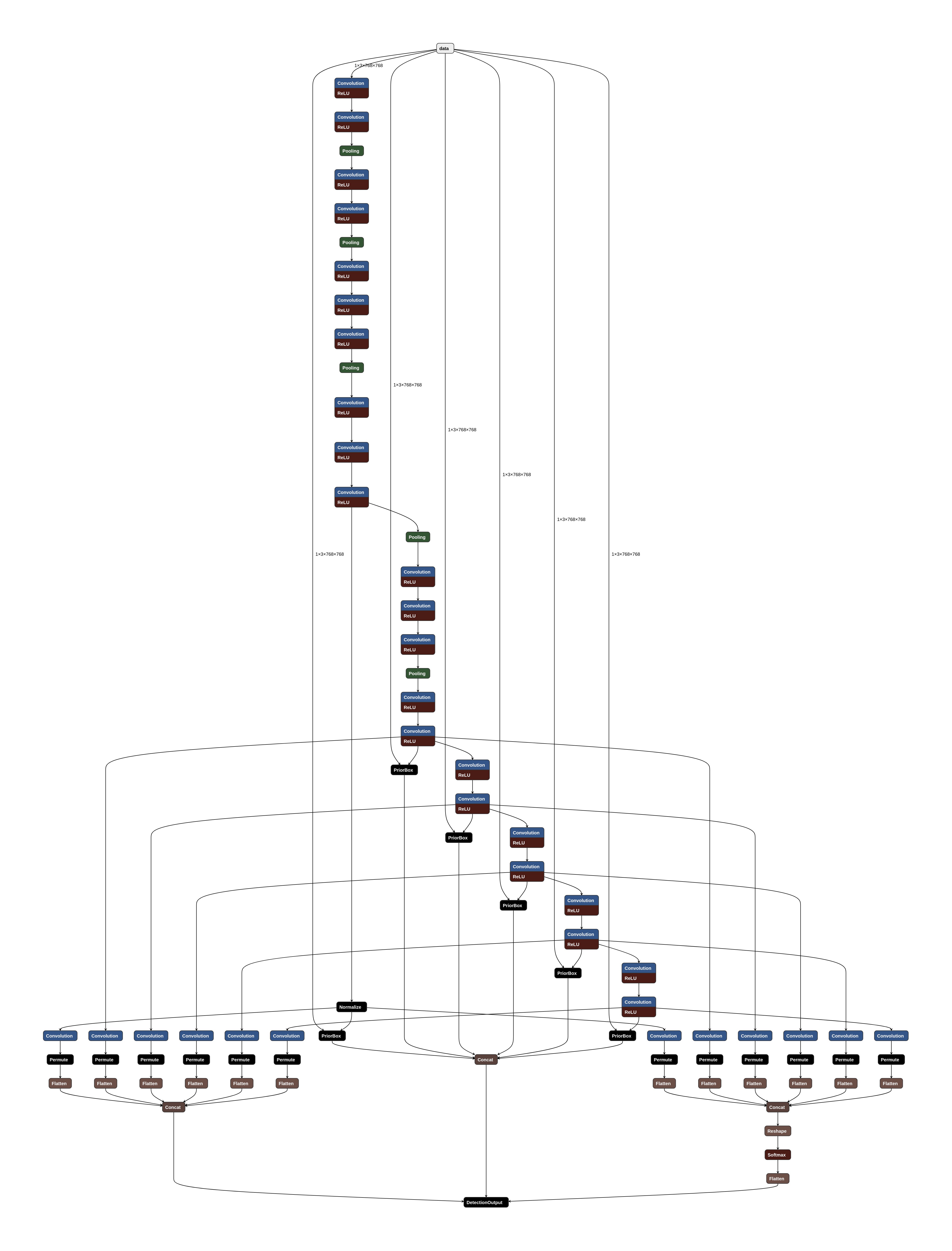
点击放大.